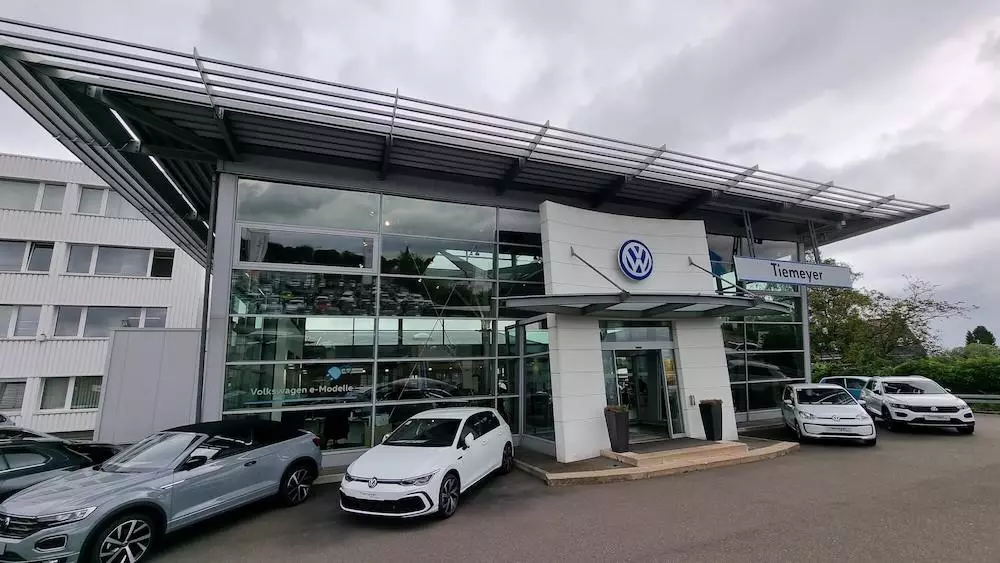Article Content

For over 65 years, the name Tiemeyer has stood for tradition, experience and progress in vehicle and vehicle technology in the Ruhr region and now throughout NRW. The Tiemeyer Group is the number one contact in NRW for brands such as Audi, Volkswagen, Volkswagen Commercial Vehicles, SEAT, CUPRA and ŠKODA.
Due to its high level of commitment and excellent performance (from the presentation of vehicles to comprehensive service), Tiemeyer has already received several awards from Audi AG and Volkswagen AG for best performance in the areas of management, consulting and service.
With currently 27 locations in 14 cities and more than 1500 qualified employees, Tiemeyer is one of the fastest growing and most successful automobile dealers in Germany.
The Tiemeyer Group already had several software applications in use for the various financial processes. Overall, the software landscape was already well organized and many of the relevant processes were largely automated.
In many places, including accounts receivable, employees worked in a centralized manner and had an overview of the entire company. However, working with different tools repeatedly led to time-consuming and costly communication loops. Communication was particularly difficult in the internal clarification of open items, which spanned various departments and the use of different media, resulting in a great loss of time and high recurring manual effort.
That's why the Tiemeyer Group was specifically looking for a solution to automatically optimize its debtor processes and get a grip on disruptions in customers' payment behavior. The company had already looked at various systems for this purpose, but had not yet been able to find a convincing provider.
The Tiemeyer Group's main motivation was about the people in the company. The employees from the specialist departments were to be relieved and the processes in the areas of accounts receivable management, receivables management and dunning accelerated.
Accounting and credit management professionals were struggling with an increasing workload and were increasingly dissatisfied with repetitive manual tasks such as tracking open item lists.
The conclusion for Andre Everts: "We urgently need to relieve our employees!"
An additional motivation for the introduction of supporting software was the problem that the process landscape in receivables management was organized in a very person-dependent manner. This means that illness or vacation of responsible personnel paralyzed several processes, which led to standstills and significantly later incoming payments, especially in accounts receivable.
In addition, invoice payments were often difficult to manage when provisional payments had been made in cash and, moreover, internal controls over their whereabouts were not possible because the technical capabilities to do so simply did not exist.
The success story with Porsche Inter Auto had finally motivated Tiemeyer to take a closer look at Bilendo. "It sounds like the system we've been looking for for a long time," says Mr. Everts.
When the decision was made to go with Bilendo, the company wanted to limit the risk of a lengthy and ultimately unsuccessful implementation. To this end, Tiemeyer first commissioned Bilendo with a proof-of-concept (POC). In this context, Bilendo took over the complete project planning and coordination with all affected project participants.
During the implementation period, Tiemeyer and Bilendo exchanged ideas in weekly meetings and together made the introduction possible. Bilendo placed particular emphasis on ensuring that as few resources as possible from the specialist departments and as few IT resources as possible from Tiemeyer were tied up in the project.
Although the company introduced SAP at the same time, Bilendo was successfully set up in parallel throughout the company with little effort and Tiemeyer's IT resources were largely spared. The ongoing day-to-day business was not affected or even disrupted at any time - and, if the plan works out, will run even better in the future.
Shortly after introducing Bilendo, Tiemeyer was able to feel the effects of the automated processes. The employees in the specialist departments are significantly relieved and also more productive and satisfied with their work.
With the use of Bilendo, the finance department now has a powerful tool at hand to also perform internal controls and to overview and optimize the quality of work using the reporting feature. Bilendo simply answers the question: Who did what and when?
In the coming months, it is expected that the number of queries from customers will decrease significantly, the average time to pay invoices will shorten, and the effort required to consult with colleagues will decrease.
It is also expected that the DSO value will be reduced by 10-15% and as a result the liquidity of the Tiemeyer Group will improve. This helps the company in its plan to expand, whereby the resulting additional work in accounts receivable can be absorbed via Bilendo instead of additional personnel.
Cost savings were never a priority for Tiemeyer, yet Bilendo was able to score with a very positive business case:
"I am pleasantly surprised at how efficient Bilendo actually is. Experience shows that the savings made when introducing new software are exceeded by the costs incurred, at least in the first year. But Bilendo was able to convince and inspire us with a business case that covers itself within one year. Our potential savings will soon exceed the costs."
Andre Everts, Tiemeyer Gruppe
Commercial Manager